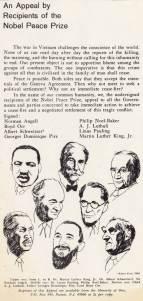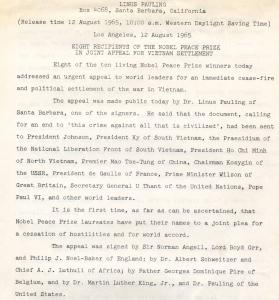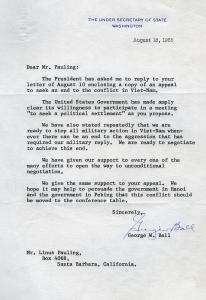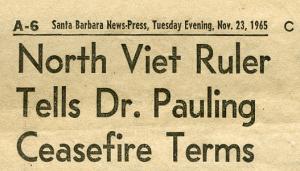
The signing of the Limited Test Ban Treaty by President Kennedy in 1963 marked a high water point in Linus Pauling’s career as a social activist. Pauling’s important contributions to bringing about the treaty led to his receipt of the Nobel Peace Prize, but also made his position increasingly untenable with those who accused him of hindering the development of the country’s military technology.
Partly as a response, Pauling decided to retire from Caltech in order to devote his efforts entirely to peace causes, leaving Pasadena for the Center for the Study of Democratic Institutions (CSDI) in Santa Barbara, California. And with this change, Pauling’s focus also switched to a new issue, the war in Vietnam, which he regarded as both unconstitutional and inhumane.
In February 1965, the CSDI sponsored “The Convocation on the Requirements of Peace,” an event held at the headquarters of the United Nations in New York City. The convocation featured speeches by scientists and leaders from around the world and was part of a widespread discussion of a Papal Encyclical, Pacem in Terris, that had called for the end of all wars. The convocation’s diverse audience also inspired Pauling to use the occasion to initiate discussions about Vietnam.
Pauling’s decision to discuss the Vietnam crisis came at a difficult time for the United Nations, the convocation’s host. The UN’s inability to mediate and prevent the political fiasco that led to the Vietnam War had weakened the organization and brought it under severe public scrutiny. Regardless, the Secretary General of the UN, U Thant, made an attempt to dispel the specter of failure with a concluding address that was both solemn and optimistic.

On August 10, Pauling’s Vietnam-related efforts took on a more direct approach when he accepted the invitation of seven additional Nobel Peace laureates to sign an appeal addressed to all governments and organizations involved in the Vietnam War. The document was appropriately titled Appeal by Recipients of the Nobel Peace Prize, and urged its recipients to take immediate action to achieve a cease fire.
The driving ideal behind the appeal was that the war could come to an end. “Peace is possible,” the document stated, and peace was what the Nobel laureates demanded. Recipients of the appeal ranged from Presidents Lyndon B. Johnson and Ho Chi Minh to Chinese leader Mao Tse-Tung to Pope Paul VI. The document’s signatories included Albert Schweitzer, Martin Luther King, Jr. and Dominique Pire.
The ultimate goal of the appeal was to stir its recipients to use their power and influence to bring about an end to the war in Vietnam. It was signed by eight of ten living Nobel peace laureates; the two who chose not to sign did so because they occupied public offices, though both expressed their approval of the call for peace. “Although I personally agree with the sentiments which have motivated this project,” wrote Lester B. Pearson, “the responsibilities of my position as prime minister of Canada impose certain limits on my freedom to endorse statements such as this.”
Joint appeals were nothing new to Pauling. In April 1962 and March 1963 he had joined others in writing to President Kennedy on the same matter. He knew how powerful an appeal of this sort could be, that documents of this type were often published in the news and became the subject of public discussions. As such Pauling was hopeful that word of the joint appeal might help to bring about change towards peace in Vietnam.
The appeal was indeed published in newspapers, including The New York Times, and did become a topic of discussion for wide swaths of the public. At the time, international stances on the Vietnam conflict remained unsettled and certain statements in the appeal provoked controversy. Accordingly, people around the country began to follow the story of the appeal, awaiting responses from the President and the United Nations.

Pauling and the other Nobel Laureates likewise waited eagerly for responses to come in. The White House, however, basically dismissed the appeal, simply responding that the President would give the appeal “his respectful attention” while noting that Washington could not negotiate with the National Liberation Front. A similar response came from U Thant at the United Nations.
To Pauling’s disappointment, by October 1965 leaders from China and Vietnam were still unwilling to respond to the appeal, and those who had responded often had little to say. In a follow up letter from the White House, a member of President Johnson’s staff stated that he could not consider the appeal until the communist armed forces in Vietnam took initiative and retreated from the battle grounds. (Over time this perception that the Viet Cong would gain an advantage if U.S. troops initiated a cease fire became a more prominent justification for continuing the Vietnam War.) The Johnson administration’s response to the appeal represented the reaction of most political leaders, who in Pauling’s opinion answered with “general approval” but also with “qualifications that amount essentially to a rejection.”

More interesting was the response issued by Pope Paul VI. Initially it appeared that he would follow the trend set by the world’s politicians in that he directed an Apostolic Delegate to respond to the appeal on his behalf rather than speaking personally. However, when invited to address world leaders on the occasion of the UN’s twentieth anniversary, the Pope took the opportunity to speak out against the war in Vietnam, summarizing his message in two bold sentences.
No more war, war never again. It is peace, peace which must guide the destinies of peoples and of all mankind.
A year later, the war in Vietnam still had not come to an end. And once again the Pope, heeding the suggestion of the Nobel laureates, used his influence in hopes that it could lead to peace. On October 4, 1966, in front of an audience of 150,000 people gathered in Saint Peter’s Square, Paul VI called on President Johnson to end the war.
By this time, Pauling’s concerned about the prolongation and intensification of the war had increased, and he too wrote to the President to inquire into efforts being made to settle the conflict. This time Pauling wrote on his own behalf and did not hesitate to call the President’s war efforts in Vietnam unworthy of a “country that could be a force for good rather than a force for evil.”
Unlike the push for a test ban treaty, which represented a major challenge but ended in success, Pauling and his seven fellow Nobel Peace laureates found their efforts to be mostly fruitless. Four years would pass between the issuing of the appeal and President Nixon’s announcement, in 1969, of a plan to end the Vietnam War. A full decade would go by between the publication of the appeal and the official end of the war in 1975.
